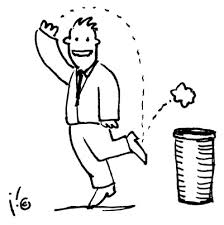“Today, Jaded Julie, we’re going to do some thinking outside of the box.”
“That shouldn’t be hard, Curmudge. You are outside of the box.”
“We’ll begin by making some assumptions for which there has been some evidence in recent years (1). Let’s assume that the earth’s average temperature has been rising linearly at 0.7 degrees Celsius per 100 years and that a total increase of four degrees C. converts the earth into a jungle. At 0.7 degrees per century, that would require 570 years. For simplicity, let’s round it off to 600 years and begin our story in the year 1410, i.e., 600 years ago.”
“I’m with you, Curmudge. Beam me down, Scottie.”
“Life was not easy in 1410. While the kings lived like kings, the common people in the country eked out a living in agriculture and those in the cities built cathedrals. Along came an all-knowing (so he thought) wizard who convinced the Pope and all the world’s kings, czars, and caliphs that we were faced with the future tragedy of global warming. (He was wrong. In 1410 we were actually at the end of the Medieval Warm Period.) Further, the wizard proposed that global warming could be averted by stopping the growth of the burning of fossil fuels, at that time coal and peat. The world’s leaders agreed with the wizard and decreed that his proposal be implemented.”
“I think I see what’s coming, Curmudge. The growth of a civilization parallels its energy use. If additional coal could not be mined, the development of civilization would have been arrested at 1410. I shudder at the thought; it would have been ‘Groundhog Day’ forever.”
”Worse than that, Julie. Without coal for steam engines, the Industrial Revolution could not have occurred, and our life expectancy would still be around 40 years. Even the printing press might not have been invented. In fact, most of the inventions created after 1410 would not have happened.”
“Things like cars, airplanes, computers, modern sanitation and health care, nuclear power, space flight, and Krispy Kreme donuts.”
“One bright spot, Julie. When the would-be wizard’s forecast did not materialize, he was probably thrown into a dungeon.”
“Is there a lesson in this, Curmudge?”
“Sure. World leaders should be wary of purported wizards; and if they do believe the wizard, they should not be taken in by recommendations of global, draconian measures. And finally, if the wizard is proven wrong, burn him at the stake.”
“Wow! The hot seat would seem fitting for someone who built his reputation on ‘warming.’ By the way, we didn’t mention Lean once in this story, and that’s supposed to be the subject of this blog.”
“Of course we didn’t, Julie. In 1410 Lean hadn’t been invented yet. But hang in there; Lean will be in our next conversation.”
(1) Plass, G.N. Carbon dioxide and the climate. Reprint of author’s 1956 article in American Scientist 98 (1) 58-67 (January-February 2010)
http://www.americanscientist.org/issues/feature/2010/1/carbon-dioxide-and-the-climate/1
Wednesday, February 17, 2010
Subscribe to:
Post Comments (Atom)

No comments:
Post a Comment